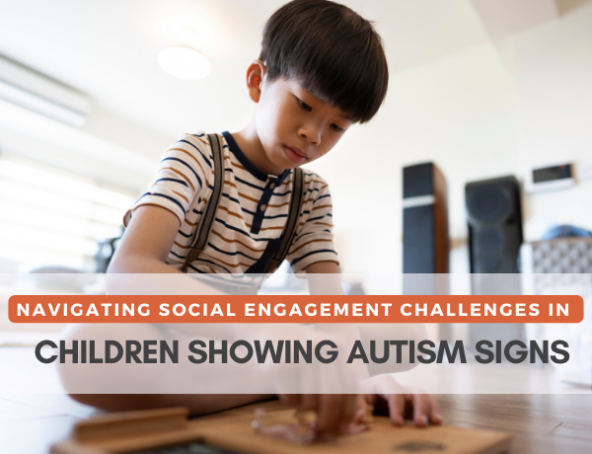Navigating Social Engagement Challenges in Children Showing Autism Signs

Navigating social engagement can be particularly challenging for children showing signs of autism. Children often face difficulties in connecting with others, which can impact their development and relationships. Understanding and addressing these challenges is crucial for effective intervention and support along with helping children to thrive in their social environments.
Understanding Social Engagement Challenges
Social engagement challenges involve difficulties in initiating, maintaining, and understanding social interactions. These difficulties can stem from a variety of factors, such as anxiety, recent changes at home or schools, trauma, and/or speech difficulties (just to name a few). For example, a child who is starting at a new school might avoid eye contact with the teacher or have trouble sharing their interests with peers.
3 Common Social Engagement Challenges in Children with Autism
Challenge 1. Lack of Eye Contact
- Definition: Demonstrating minimal eye contact during interactions.
- Example: A child looks away when others approach them or speak to them or may demonstrate fleeting eye contact during play with others that does not improve with more time.
Challenge 2. Difficulty in Understanding Social Cues
- Definition: Challenges in interpreting facial expressions, body language, and verbal cues.
- Example: A child smiles when a parent is crying or does not look where a sister is pointing.
Challenge 3. Limited Interest in Peer Interactions
- Definition: Preferring solitary activities or struggling to engage with peers.
- Example: A child plays alone during recess or requires significant adult prompting to join group activities, moving away when peers start pretend-play.
Communication Challenges in Social Settings
Children with autism often face significant communication challenges that can hinder their ability to interact effectively in social settings. These challenges can vary but commonly include difficulties in initiating conversations, turn-taking, and using language appropriately. Here are some key areas to understand:
Difficulty in Initiating Conversations
- Definition: Struggles to start conversations or join group discussions.
- Example: A child does not know how to begin a conversation with classmates or adults and instead may just blurt out their thoughts or does not respond unless specifically told to speak
Challenges in Turn-Taking
- Definition: Difficulty in taking turns during conversations or group activities.
- Example: A child interrupts others or monopolizes conversations without waiting for their turn.
Pragmatic Language Difficulties
- Definition: Trouble using language appropriately in social contexts, like staying on topic or understanding jokes/ sarcasm/ teasing.
- Example: A child talks excessively about their interests without considering others' interests or experiences. A child/ teen becomes mad when told they are “a silly goose.”
Importance of Social Skills Development
Developing social skills is crucial for all individuals' children with autism as it helps them build meaningful relationships, navigate their needs, and enhance their overall quality of life.
Here are 3 key reasons why social skills development is important:
Reason 1: Building Meaningful Relationships
- Importance: Fostering social skills to build meaningful connections with peers and family members.
- Example: Developing friendships and maintaining positive relationships contribute to a child's emotional well-being and social integration.
Reason 2: Navigating Needs
- Importance: Understanding social interactions to increase independence and navigate the world.
- Example: Responding appropriately to authority figures and adequately sharing needs, like pointing to food when hungry or requesting a band-aid when hurt.
Reason 3: Enhancing Quality of Life
- Importance: Improved social skills enhance the child's overall quality of life by increasing opportunities for social participation and inclusion.
- Example: Successful social interactions lead to increased confidence, self-esteem, and independence.
Strategies for Navigating Social Engagement Challenges
Implementing effective strategies can help children with autism overcome social engagement challenges. These strategies include early intervention, social skills training, role-playing, and modeling, and creating structured social opportunities. Here is how each strategy can make a difference:
Early Intervention
- Method: Addressing social engagement challenges early for improved outcomes.
- Example: Early intervention programs focus on developing social skills and teaching strategies for navigating social interactions.
Social Skills Training
- Method: Participating in social skills groups or therapy sessions to learn and practice social skills.
- Example: Weekly social skills groups focusing on turn-taking, conversation skills, and understanding social cues.
Role-Playing and Modeling
- Method: Using role-playing and modeling to teach and reinforce appropriate social behaviors.
- Example: Practicing social scripts and scenarios with the child to teach conversational skills and problem-solving strategies.
Creating Structured Social Opportunities
- Method: Providing structured opportunities for social interaction and peer engagement.
- Example: Organizing playdates, joining social clubs, or participating in group activities with adult supervision.
Recognizing and addressing social engagement challenges in children showing signs of autism is essential for effective intervention and support. By implementing strategies and seeking professional guidance, parents, caregivers, and educators can help children navigate social interactions and develop essential social skills, leading to better emotional well-being and social integration.
AZA United's Family Support Team provides support and guidance for families facing any number of challenges as they navigate the Autism journey. This service is available at no charge to all members of the autism and developmental disability community. You may make a phone appointment that works with your schedule by visiting azaunited.org/supportcall
You may also be interested in:
For more helpful resources and information, follow AZA United on social media:






